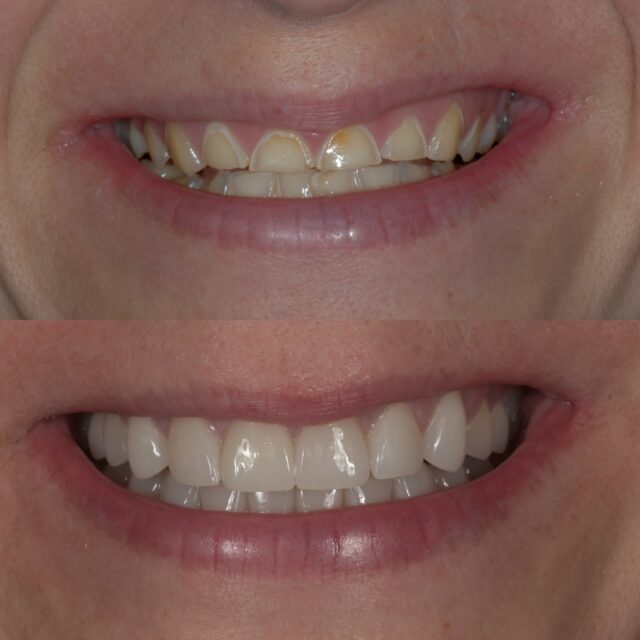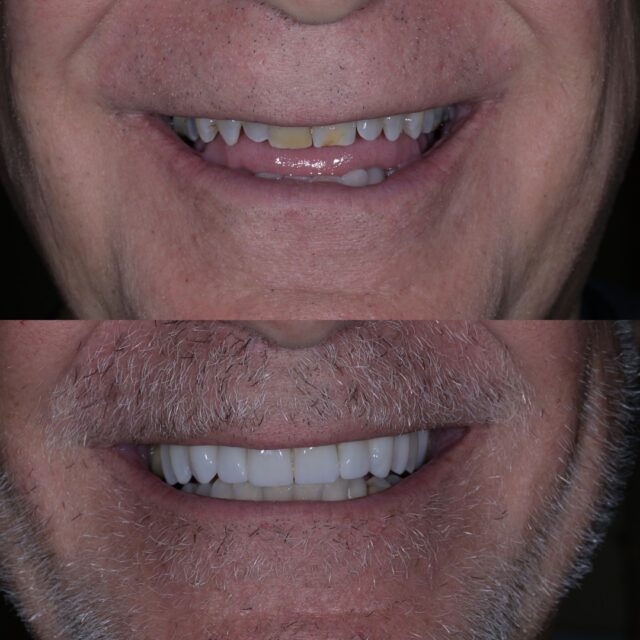Veneers offer a transformative solution for achieving a dazzling smile. Whether you’re bothered by gaps, chips, or discoloration, these thin but durable, custom-made shells can dramatically enhance the appearance of your teeth. This blog will walk you through everything about veneers and help you determine if they’re the right choice. Remember, Dr. Gatta and his dedicated team are devoted to delivering top-tier dental care in a beautiful, welcoming, and comfortable office. Come in and meet with them and get your questions answered: BOOK HERE.
What Are Veneers?
Dental veneers (sometimes called porcelain veneers or dental porcelain laminates) are wafer-thin, custom-made shells of tooth-colored materials designed to cover the front surface of teeth to change your appearance. These shells are bonded to the front of the teeth, changing their color, shape, size, or length. They can cover cracks, make the teeth look bigger, or remove space between teeth.
Types of Veneers
Veneers can be made from porcelain or from resin composite materials. You can discuss the best choice of veneer material for you with your dentist.
Lumineers vs. veneers
Lumineers are a kind of porcelain veneer that are much thinner than standard veneers and less durable.
You may need to replace them more often than regular veneers. Unlike other types, lumineers don’t require much (if any) prep work. To apply other types of veneers, the dentist has to remove some of the enamel on the front of your teeth.
Pop-on veneers
Pop-on veneers – also known as removable or snap-on veneers – cover your natural teeth to hide any issues. Pop-on veneers:
- Instantly change the look of your smile
- Are one of the least expensive veneer options
- Can be taken out at any time
Pop-ons can make it hard to eat, and they can change the way you talk.
Composite veneers
Composite veneers can help fix small issues, such as a cracked tooth or a small gap in your teeth. Your dentist applies a composite resin – made of plastic and ceramic – directly to your teeth. In many cases, the entire treatment can be finished in one visit. Composite veneers are one of the most common treatment options.
No-prep veneers
While no-prep veneers are much less involved than other types, they still require the removal of some enamel. This treatment is great for fixing small gaps in your teeth. Check with your dentist to see whether no-prep is right for you.
Porcelain veneers
Porcelain veneers resist stains better than resin veneers. They have more of the light-reflecting features of natural teeth. Your dentist will remove some enamel from your teeth and custom-fit the veneers to them. The enamel removal makes the surface of your teeth rough and helps keep the veneers in place.
Who Gets Veneers?
Veneers are often used on teeth that:
- Are discolored because of:
- Root canal treatment
- Stains from tetracycline or other drugs
- Excessive fluoride
- Large resin fillings
- Other causes
- Are worn down
- Are chipped or broken
- Are crooked, uneven, or oddly shaped (for example, have craters or bulges in them)
- Have gaps between them (to close the space)
Veneer Procedure
Getting a dental veneer usually requires three trips to the dentist – one for a consultation and two to make and put on the veneers. This can happen on one tooth or many teeth at the same time.
Diagnosis and treatment planning
First, you will talk to your dentist about the result you want. During this appointment, your dentist will look at your teeth to make sure dental veneers are right for you. You’ll discuss the procedure and some of its limits. They may take X-rays and possibly make impressions of your mouth and teeth.
Preparation
To get a tooth ready for a veneer, your dentist will reshape the tooth surface. They’ll take off an amount roughly equal to the thickness of the veneer that will be added to the tooth surface. You and your dentist will decide whether they numb the area before trimming off the enamel. Next, your dentist will make a model, or impression, of your tooth. This model is sent out to a dental laboratory, which makes your veneer. It usually takes 2-4 weeks for the veneers to come back from the lab. Temporary dental veneers can be used in the meantime.
Bonding
Your dentist will place the veneer on your tooth to check its fit and color. They’ll remove and trim the veneer – probably a few times – to get the proper fit before they cement it to your tooth. Next, to prepare your tooth to receive the veneer, it will be cleaned, polished, and etched. Etching roughens the tooth to allow for a strong bonding process. A special cement is applied to the veneer, and it is then placed on your tooth. The veneer color can be adjusted with the shade of cement used. Once the veneer is properly positioned, your dentist will shine a special light beam on it to activate chemicals in the cement, which cause it to harden very quickly. The final steps involve removing any excess cement, checking your bite, and making any needed adjustments. Your dentist may ask you to come back for a follow-up visit in a couple of weeks to check your gums and the veneer’s placement.
Dental Veneer Benefits
Veneers offer these advantages:
- They look like a natural tooth.
- Gums usually aren’t sensitive to porcelain.
- Porcelain veneers are not easily stained.
- A color can be selected to make darker teeth appear brighter.
- They generally don’t require as much shaping as crowns do, and they are stronger and look better.
Dental Veneer Risks
Veneers are known to be very sturdy and long-lasting. But they do have some drawbacks, too.
What is the downside of veneers?
Some disadvantages to porcelain veneers include:
- The process cannot be undone.
- Veneers cost more than composite resin bonding.
- Veneers usually cannot be repaired if they chip or crack.
- Because enamel has been removed, your tooth may become more sensitive to hot and cold foods and drinks.
- If you only get one or a few veneers, they may not exactly match the color of your other teeth. Also, the veneer’s color cannot be changed once it’s in place. If you plan on whitening your teeth, you need to do so before getting veneers.
- Though not likely, veneers can come loose and fall off. To reduce the chance of this happening, do not bite your nails, chew on hard things (like pencils, ice or other objects), or otherwise put too much pressure on your teeth.
- Teeth with veneers can still decay. If that happens, it could mean covering the whole tooth with a crown.
- Veneers are not a good choice for people with unhealthy teeth (for example, those with decay or active gum disease), weakened teeth (as a result of decay, fracture, large dental fillings), or for those who don’t have enough existing enamel on the tooth surface.
- If you clench or grind your teeth, porcelain veneers may not be for you. The veneers could crack or chip.
How Long Do Veneers Last?
Generally, veneers last several years. They would need to be replaced if they come off or get damaged.
Are veneers permanent?
Most veneers are physically joined to your teeth, so they are permanent and cannot be reversed once they are put on. Some types of veneers – such as no-prep or pop-on – are reversible.
How long do composite veneers last?
Composite veneers last 5 to 7 years. They’re made from a combination of plastic and ceramic, so they’re not as strong and long-lasting as porcelain veneers.
How long do porcelain veneers last?
Porcelain veneers can last as long as 20 years, often making the higher price tag worth it. They’re strong, less prone to getting stained or changing color, and will protect your teeth from further damage.
Dental Veneer Aftercare
Dental veneers do not require any special care. Keep up your good oral hygiene habits, including brushing, flossing, and rinsing with an antiseptic mouthwash as you normally would.
Even though porcelain veneers resist stains, your dentist may recommend that you avoid stain-causing foods and beverages (for example, coffee, tea, or red wine). And they might tell you to avoid hard, crunchy foods.
Veneers Cost
The cost of your veneers may depend on what part of the country you live in and how much work you want done.
Are veneers covered by insurance?
Veneer Alternatives
Alternatives to veneers include implants, bonding, and crowns. Veneers are a nice in-between option. Veneers may be your best choice if you want to change the shape of your teeth more than just a little bit, as is done with bonding, but not enough to require a crown.
Veneers vs. crowns
Think of it this way: a veneer is like a facelift for your teeth. It only covers the front of your tooth to make it look whiter and brighter. It’s mainly a cosmetic procedure, or one done for looks. A crown is designed to repair and strengthen damaged or decaying teeth. It covers the whole tooth.
Veneers vs. implants
If your teeth are healthy, veneers are a quick way to brighten your smile and hide any gaps or other issues. Implants are usually recommended if you have unhealthy teeth or some that are missing because of disease or an accident. Veneers are about one-third the cost of implants.
Teeth bonding vs. veneers
Bonding is a cosmetic procedure for teeth that are discolored, crooked, or chipped. A dentist applies a tooth-colored composite resin material. Unlike veneers, bonding does not require the dentist to remove much enamel from your teeth. Every 3 to 10 years you’ll need to have the dentist touch up or replace your bonding. The process is reversible. In most cases, veneers are not reversible.
Takeaways
If you want to change the look of your teeth, you and your dentist might talk about veneers.
- Different kinds of veneers last from 5 to as long as 20 years, depending on what they’re made of. Porcelain veneers last the longest.
- Porcelain also costs the most. Composite veneers are less expensive and are not quite as strong and long-lasting as porcelain.
- Veneers are usually done because you want your teeth to look better, so they’re considered “cosmetic” and aren’t usually covered by insurance.
Crafting the perfect smile is an art and a science. At Innovative Dental Aesthetics, we believe every detail matters. From initial consultation to final placement, our team collaborates closely to ensure your veneers exceed expectations. Dr. Derek Gatta works hand-in-hand with skilled ceramists to create the best porcelain veneers that reflect your unique smile goals. Schedule an appointment today at (561) 997-6622. Head over to our Instagram for daily tips.
Reference: [https://www.webmd.com/oral-health/veneers]


















